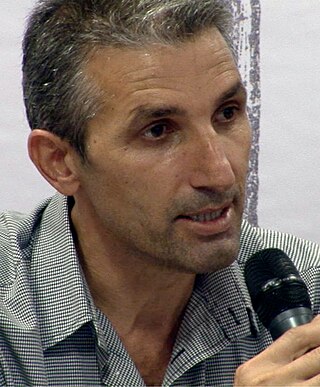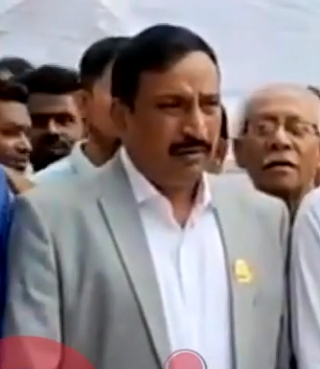
The Committee to Protect Journalists (CPJ) is an American independent, 501(c)(3) nonprofit, non-governmental organization based in New York City, with correspondents around the world. CPJ promotes press freedom and defends the rights of journalists. The American Journalism Review has called the organization, "Journalism's Red Cross." Since the late 1980s, CPJ has been publishing an annual census of journalists killed or imprisoned in relation to their work.

José Rubén Zamora Marroquín is an industrial engineer, entrepreneur, and the founder of three Guatemalan newspapers: Siglo Veintiuno in 1990, El Periódico in 1996, and Nuestro Diario in 1998. He has been threatened and attacked on several occasions for his work, including being held hostage in his home in 2003 and being kidnapped and beaten in 2008.
Mazen Dana was a Palestinian journalist who worked as a Reuters cameraman. He spent a decade covering the Israeli–Palestinian conflict in Hebron in the West Bank, for which he was awarded the 2001 International Press Freedom Award of the Committee to Protect Journalists. He was shot and killed by US soldiers in Baghdad, Iraq on 17 August 2003.

Gustavo Andrés Gorriti Ellenbogen is a Peruvian journalist known for his reporting on rebel groups, government corruption, and drug trafficking. In 2011, the European Journalism Centre described him as having "been awarded more prizes than probably any other Peruvian journalist". He is the founder of IDL-Reporteros.
Željko Kopanja was a Bosnian newspaper editor and director of the newspaper Nezavisne Novine. The Christian Science Monitor described him as an equal critic of all parties without regard to ethnicity and "probably the most feared journalist in Bosnia and Herzegovina." On August 8, 2016 Željko Kopanja died from a cardiac arrest.

Fulgazi, also spelt Phulgazi, is an upazila of the Feni District, located in Bangladesh's Chittagong Division. It is best known as the home upazila of Khaleda Zia, a former Prime Minister of Bangladesh.
The CPJ International Press Freedom Awards honor journalists or their publications around the world who show courage in defending press freedom despite facing attacks, threats, or imprisonment. Established in 1991, the awards are administered by the Committee to Protect Journalists (CPJ), an independent, non-governmental organization based in New York City. In addition to recognizing individuals, the organization seeks to focus local and international media coverage on countries where violations of press freedom are particularly serious.
Mustafa Haji Abdinur is a Somali journalist and radio correspondent. He was awarded a CPJ International Press Freedom Award by the Committee to Protect Journalists in 2009.
Grémah Boucar, also known as Grémah Boukar Koura, is a Nigerien journalist.
Umar Cheema is a journlist and investigative reporter for the Pakistani newspaper The News. In 2008, he won a Daniel Pearl Journalism Fellowship, becoming the first Pearl fellow to work at The New York Times.

Nedim Şener is a Turkish writer and journalist who has written for the Milliyet and Posta newspapers. He has received a number of journalism awards, including the Turkish Journalists' Association Press Freedom Award, the International Press Institute's World Press Freedom Heroes award, and PEN Freedom of Expression Award. He is particularly known for his 2009 book on the assassination of Hrant Dink, which showed the role of Turkish security. He is under indictment in the Odatv case of the Ergenekon trials because, he believes, his 2009 book alleged that police officers responsible for the Ergenekon investigation were responsible for the Dink murder.
María Cristina Caballero is a Colombian journalist known for her coverage of organized crime, corruption, and paramilitary forces. In 1999, she was awarded the International Press Freedom Award of the Committee to Protect Journalists.
Steven Gan is a Malaysian journalist known for co-founding and editing the political news website Malaysiakini, Malaysia's "first and only" independent news source.

Ignacio Gómez is a Colombian journalist known for his high-risk reporting on organized crime, corruption, and paramilitary groups. In 2000, he received the "Special Award for Human Rights Journalism Under Threat" Amnesty Media Award. In 2002, he was awarded the International Press Freedom Award of the Committee to Protect Journalists.
Musa Kaimovich Muradov is an ethnic Chechen Russian journalist. In 2003, he was awarded the International Press Freedom Award of the Committee to Protect Journalists for his reporting on the Second Chechen War.

Janet Hinostroza is a television journalist from Ecuador. Her work focuses on the exposure of government corruption. She is the anchor on a morning news program, La Mañana de 24 Horas, and was the creator and anchor of the long-running investigative news program 30 Plus, which aired on Teleamazonas for more than a decade, investigating such subjects as human trafficking, arms trafficking, government and police corruption, and extrajudicial killings.

Mike O'Connor was a German-born American journalist, war correspondent, and Mexico's representative for Committee to Protect Journalists (CPJ), a New York-based nonprofit organization dedicated to promote press freedom around the world. Born in Germany following World War II to Americans stationed in a refugee camp, O'Connor began his career as a journalist in the 1980s. As a foreign journalist, he covered civil wars and conflicts for NPR, The New York Times, CBS News, among others.

Joynal Abedin Hazari was a Bangladeshi politician who was a member of the Bangladesh Awami League and served as a member of Jatiya Sangsad, representing the Feni-2 constituency. He won election in 1986, 1991 and 1996.

Nizam Uddin Hazari is an Awami League politician and a former Jatiya Sangsad member representing the Feni-2 constituency.










